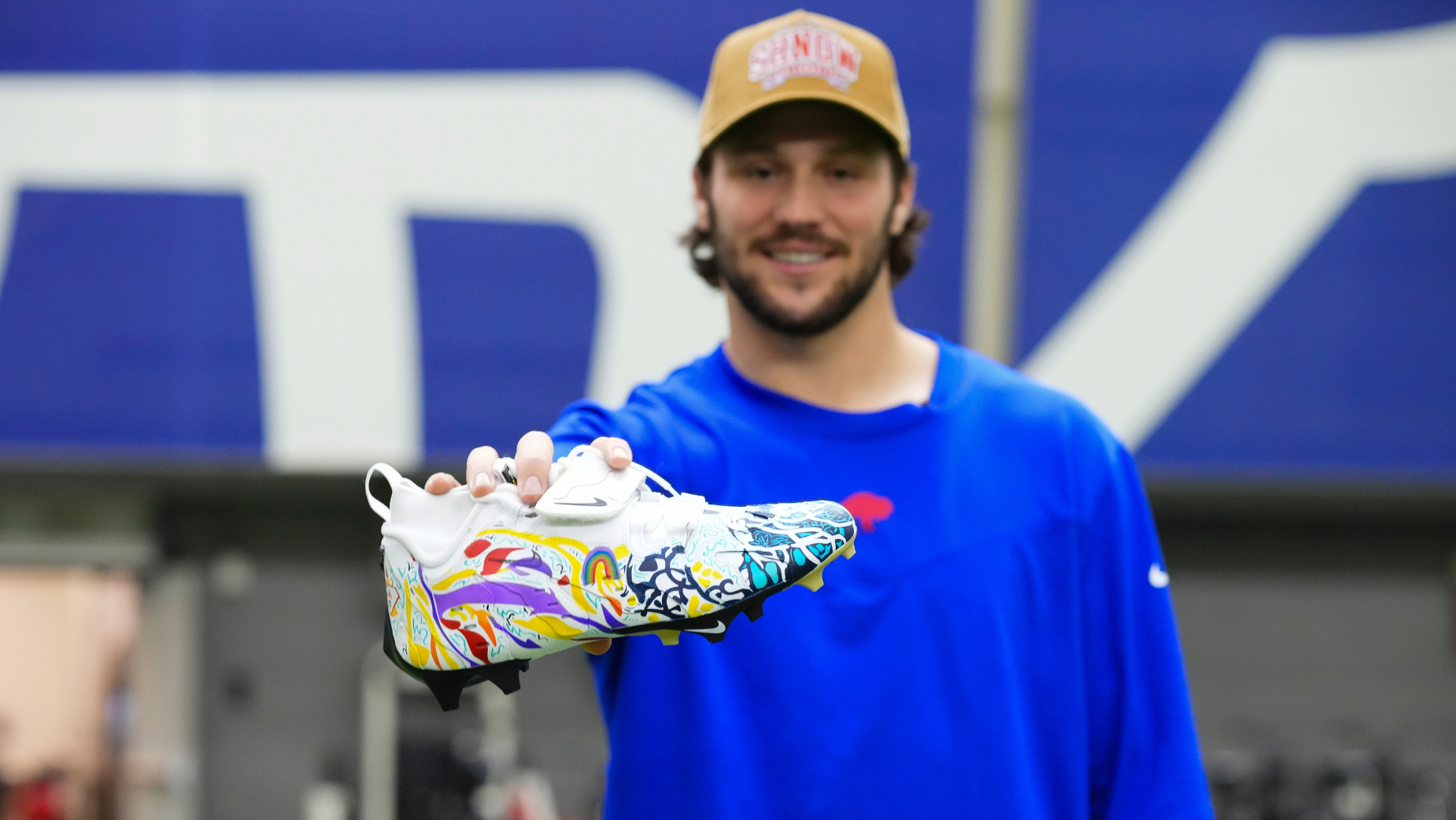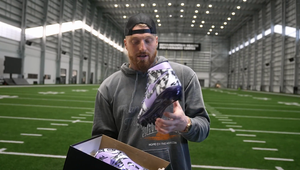
How AI Designed Josh Allen’s Superman Touchdown Cleats

During Weeks 13 and 14 of the NFL season, players are allowed to wear customised cleats in honour of charitable causes - an initiative called ‘My Cause, My Cleats’. This year, Amazon Web Services (AWS) looked to this moment to tell a brand story about its relationship with the league, led by LA-based digital production company Wildlife by putting generative AI in the hands of three NFL superstars.
As well as developing an AI Cleat Creator, using AWS-enabled generative AI tools, Wildlife also produced and finished an entire campaign's worth of social content deliverables, directed by ECD Scott Friedman. The films tell the powerful stories of the Buffalo Bills’ Josh Allen, Las Vegas Raiders’ Maxx Crosby and Seattle Seahawks’ DK Metcalf designing their shoes to represent and support their respective causes: Oishei Children’s Hospital, Stand Up for Pits, and SOUND Health and Prison Fellowship.
“Even with the AI and technology, we were able to actually bring in more human involvement,” says Scott. “We brought in folks from those organisations so they could meet, tell their stories and collectively work on the shoe. It makes for a more meaningful connection for the athletes, helps the organisations get the message out more, and makes for great content,” he adds, “watching these athletes interact with everyday folks - especially the kids at the hospital in Buffalo.”
Wildlife has previously worked with AWS to bring NHL and NFL stats to life with AI-powered installations and web games like ‘Interactive Ice’ and ‘Defense Decoder’. But this time, their work would be worn on the field, and broadcast to millions.

AI Kicks Off
Wildlife first created highly detailed 3D models of the football players’ exact game shoes using a photogrammetry studio. They then researched the typical design elements, patterns and textures that the NFL’s artists apply to custom cleats.
Then the team developed a bespoke pipeline for the creation of an AI Cleat Creator - inspired by shoe designers like Nike ID. The finished product combined tools available on Amazon Bedrock, including Claude, Anthropic’s AI assistant, and text-to-image models from Stability AI. It converts descriptive inputs into detailed prompts, and then uses these to produce high-resolution images, wrapped onto the 3D cleat model.

Wildlife also had to scale the processing power of the Creator to handle many prompts in real time before the public website was deployed. “That’s the industry's next big challenge,” says Scott. “It's great when a website has moderately healthy traffic, or with an on-site activation at an event, but when they shouted out our website during Sunday Night Football, you could see how quickly the demand gets really intense for that kind of process.”
“We scaled up as much as we could and everything went well, but it's a whole new ball game. It’s early days - scaling that technology and making it more efficient.”
Using the AI, the players had hands-on control over the cleats’ textures, colours and more, and could use a pre-fabricated asset library of logos and text from the partner organisations which AI would otherwise struggle to generate. They even scanned drawings from the children at Oishei Children’s Hospital for Josh Allen to incorporate into his design.

Above: Scott showing DK Metcalf the AI Cleat Creator
“We really tried to think about what would be the right array of tools for the athletes, not knowing what they were going to do,” says Scott. “They hadn't seen this thing until we got on set at their practice facilities.” After a five-minute tutorial, the athletes had free rein, and the adrenaline kicked in while Scott and the team filmed the process.
“You never know what they're going to type in.. and you're going to get a different result every time,” he explains, sharing how they resisted the urge to jump in and let the athletes’ personalities shine through and combine with the charities’ inputs. “It was really rewarding to watch how they used it, and they all said how intuitive it was. We just try to think about best practices for these kinds of experiences.”
Lacing Up on Game Day
Wildlife sent the 3D models and flat textures for the designs, as well as the correct shoe models and laces, to the NFL’s artists to hand paint and airbrush onto the cleats for the players to wear.

Above: Josh Allen's cleats being painted
“It was almost like handing things off with a prompt to the AI again,” says Scott. “Some of these designs are a little more elaborate than what people would normally put on their cleats, so not an easy thing to recreate, necessarily. And everyone did a great job!”
While Maxx Crosby and DK Metcalf had exciting games in their cleats, Scott says the “flagship moment” was Josh Allen’s primetime Sunday Night Football game in the snow, culminating in “iconic photos of Josh Superman diving into the endzone” wearing his AI-designed shoes.
A Human-First Tech Story
Wildlife took an authentic, documentary-style approach to the accompanying social films and planned extensively to cover each beat of the cleats’ story, without looking overly produced. The small film crew, directed by Scott, travelled to each of the player’s cities – Buffalo, Las Vegas and Seattle – finding a consistent workflow and visual language before handing over to a hungry team of five editors. “We got the authentic interactions between the athletes and folks in the [charitable] organisations, and leaned into that human side.”
This was vital, as Scott wanted to emphasise the personal touches and humanity to shine through what’s otherwise a story about AWS’ generative AI offerings. “It’s a tech story, in a lot of ways, but ultimately it’s about using the technology to celebrate the athletes’ causes and find a way to help people through wearing these shoes.”
The team also had to balance which parts of the story to focus on across the wide variety of formats included in over 40 deliverables - from 90-second cuts to 15-second teasers, sizzle reels, graphic explainers and more. Not to mention designing an AI tool that would look great on screen, while being functional and easy to use for athletes in the short time they had.
“I’m proud of the way we managed to do that and work with the teams as well,” says Scott. “They were able to get our footage and expand on some of those stories, so it became a really powerful campaign with a lot of visibility. We had the athletes, teams and AWS posting it, and some of the spots are going to run on broadcast around NFL games as well. That was not the original plan, but it speaks to their reception.”
After the Final Whistle
It doesn’t end with the films either. Fans have a chance to win the game-worn cleats from each athlete, and have created more than 22,000 of their own sharable designs through the website. Wildlife also brought the experience to a special AWS customer event at Allegiant Stadium last week, the home of Maxx Crosby’s Las Vegas Raiders.
“It was really cool seeing that [activation] on an NFL field, bringing it full circle,” says Scott. “It’s always fun to look over everyone’s shoulder at the funny prompts, the weird results, the beautiful results, and everything in between. Everyone's always trying to push the technology and find its limits.”
As a result, this project served to remind Scott of the importance of open-endedness when it comes to creating generative AI tools, all while ensuring each output hits a standard of quality and visual consistency.

“As the technology gets better, the ways you do that will probably change but I think that's the great thing about AI - dynamic personalisation at an incredible scale,” he says. “So it’s about remembering those aspects and maintaining them even as the technology gets really good.”
“How do we make sure that we don't take the human side out of it?” he asks. “Because that's really what makes it powerful - the fact these cleats were not just made by an AI, but in conjunction with kids who contributed artwork, and athletes who crafted the prompts, and then brought to life by an artist. That synergy is always where the best work is… The meeting of the different sides of the mind always brings the best results. AI is just a different way of finding that partnership.”















